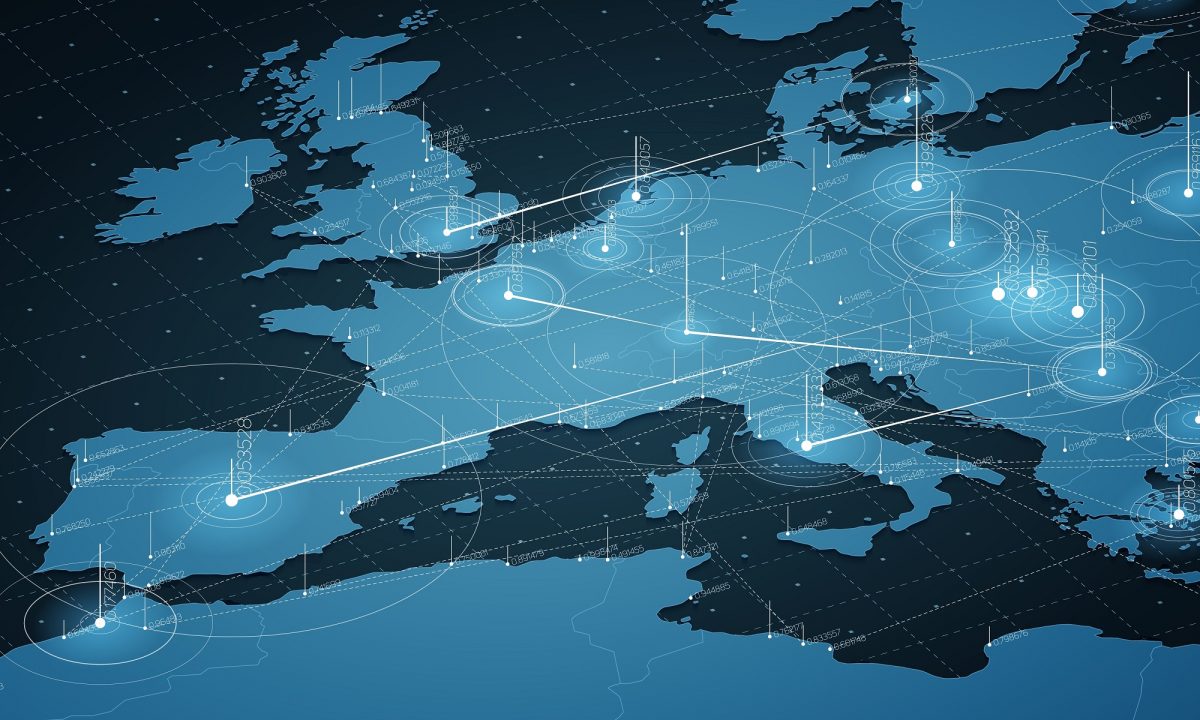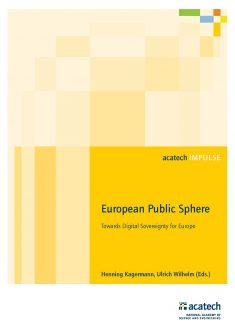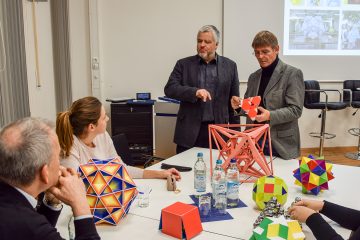Digital sovereignty: High-caliber project group presents concept for a European Public Sphere

Munich, 16 July 2020
A digital ecosystem committed to European values, relying on democratic control and facilitating digital sovereignty: A project group led by Henning Kagermann (acatech) and Ulrich Wilhelm, the director of Bayerischer Rundfunk (BR), is drafting a concept for a European Public Sphere (EPS) in the digital space. In a discussion paper bearing the same name, and released by acatech – the German National Academy of Science and Engineering – the group is advocating an ambitious European political initiative to establish such a public sphere. It is to be realized by a broad alliance embracing the private sector, knowledge institutions and civil society.
The coronavirus crisis has highlighted the usefulness of digital platforms. They enable us to remain in virtual contact while physically distancing, whether in digital classrooms, the working world or private life. But Europe’s dependencies in the digital world have also become evident. The dominant digital platforms are provided by non-European companies. The same applies to the most powerful data infrastructures. Europe and its citizens have little input on the nature and structure of the digital public sphere and thus few opportunities to shape an infrastructure that plays a central role in social life, the establishment of political consensus, individual freedom and the private sphere, and economic competitiveness.
The project group is proposing the creation of a digital ecosystem aligned with European values such as openness and diversity. The group’s discussion paper “European Public Sphere – Shaping Europe’s Digital Sovereignty”, published today, describes the path to such a digital space, where a diverse range of services can emerge with fair and transparent conditions for access and use.
Digital infrastructure as a component of public services
In contrast to healthcare, education or transportation, the digital infrastructure has so far not been treated as part of public services. For a public digital sphere, however, a basic infrastructure – in a manner of speaking, a freely accessible system of roads and pathways – is needed. Consequently, the state must assume a coordinating role. The initial creation of an open, European digital ecosystem will require state funding flanked by European regulation.
European values in technology design
Technology is never neutral, and is always influenced by the environment in which it emerges. Europe is committed to such values as human dignity, self-determination, plurality, openness, privacy, security, democracy, justice, solidarity and sustainability. The role of the European Public Sphere will be to implement these values in the form of guiding principles for the design of technologies.
Technology strategy to foster broad diversity
The technology of the European Public Sphere must be characterized by modularity, interoperability and openness: In contrast to today’s closed and monolithic platforms, open standards will ensure that technologies developed in the EPS can be easily reused, developed and adapted locally, and optimally combined with other technologies. Such basic technologies and application modules will permit a diverse range of business models, platforms and products in all industries and fields such as digital education, e-government and Europe-wide media.
Digital agency and independent alliance
In addition to a public-sector coordinating unit such as a European digital agency or a network of agencies, the expert group proposes an independent “European Public Sphere Alliance” organized on a cooperative basis. It will be open to participants from the private sector, civil society, media, knowledge institutions and other public institutions. Their members will jointly develop technology components as the basis for creating and marketing both non-commercial and private-sector platforms and services.
The new platforms and services are not intended to replace existing ones, but rather to offer highly functional and trustworthy alternatives. “If Europe takes decisive action now and launches an ambitious initiative, a public digital sphere can be created that offers fair conditions for access and use, strengthens public discourse and ensures the plurality that fosters European identity” says BR director Ulrich Wilhelm. Henning Kagermann adds: “We want to strengthen digital sovereignty – in other words, the autonomy of Europe, as a community based on rights and values, and of each individual user. It is important to note that we are securing digital sovereignty through openness and freedom of choice. Anyone who respects European values can be involved in creating the European digital public sphere.”
The discussion paper from the German National Academy of Science and Engineering was released by Henning Kagermann (Chair of the acatech Board of Trustees) and Ulrich Wilhelm (Director of Bayerischer Rundfunk and member of the acatech Board of Trustees). Members of the project group:
- Markus Haas, CEO Telefónica Deutschland
- Thomas F. Hofmann, President of the Technical University of Munich
- Paul-Bernhard Kallen, CEO Hubert Burda Media
- Johannes Meier, Chairman of the Advisory Board of Cliqz GmbH
- Jan-Hendrik Passoth, Technical University of Munich (TUM), Munich Center for Technology in Society
The project has received ideas and support from other individuals and experts from the private sector and the world of research. The project group’s paper is intended to encourage politicians to take up the initiative to design a European public sphere while Germany holds the presidency of the EU Council.




